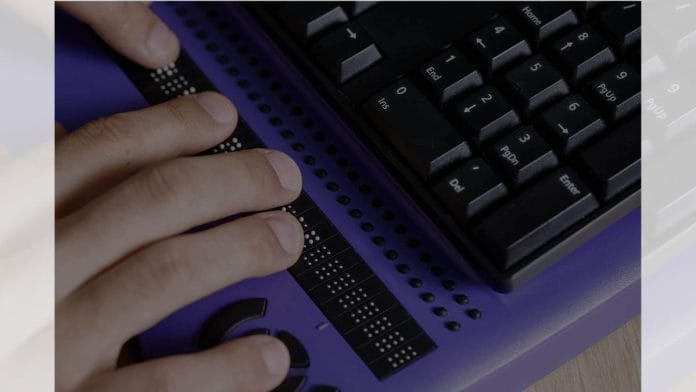New Delhi: Rahul Kumar, a visually-impaired assistant manager at the Indian Overseas Bank, has been struggling for three years to get a screen reader to assist him with his job. Despite repeated requests, the bank hasn’t provided him with a screen reader or any other assistive technology. Instead, he’s been transferred six times during this period, each time farther away from his hometown, Noida.
After years of struggle, Kumar turned to the courts–and last week (29 May), the Delhi High Court granted him relief when it ordered the bank to take a decision on granting him a screen reader and other assistive technology in four weeks, in line with the law and the bank’s equal opportunity policy.
In an important step towards ensuring that employees with disabilities are allowed to work with dignity and given the support needed to be productive at their workplace, Justice Prateek Jalan also said that Kumar should not be transferred without his consent until the next hearing on 14 October.
“The court prohibited the bank from making any further transfers without the employee’s consent or preference. The bank was given four weeks to file its counter. This is an important initiative for employees with disabilities,” Kumar’s lawyer Rahul Bajaj told ThePrint. “We are happy that the court is alive to the petitioner’s struggles as a blind employee in ensuring equal dignity and productivity in the workplace as his able-bodied counterparts.”
The case also highlights the gap between institutional policies on the inclusion of people with disability and their actual ground-level implementation.
Besides Bajaj, non-profit Mission Accessibility co-founder Amar Jain also appeared in this case alongside advocates Sarah and Taha Bin Tasneem. Bajaj said the lawyers were hopeful that Kumar would be provided with an “even platform” to realise his full potential, setting a precedent for others.
Also Read: Why Delhi court pulled up cops for ‘casual attitude’ in probing case against minister Kapil Mishra
The story behind Kumar’s case
Kumar, also a distinguished para-athlete, began working at the Indian Overseas Bank in April 2022. He approached the Delhi High Court this year on two main grounds—the first was his contention that the bank had failed to create an enabling environment for him at the workplace.
Despite repeated requests, his workplace had not provided him with essential assistive technology, like a screen reader, which is indispensable for a blind employee to perform crucial official functions.
“This failure has effectively placed him at a disadvantage when compared to his sighted counterparts and is a clear violation of the legal obligation to provide reasonable accommodation,” the plea said, citing the Rights of Persons with Disabilities Act, 2016, and the Rights of Persons with Disabilities Rules, 2017.
It also said that the absence of such support hindered Kumar’s ability to function independently and efficiently, leading to an undermining of his dignity and right to equality.
Secondly, he was subjected to repeated and arbitrary transfers in stark violation of protection from routine postings and transfers. “Over the past three years, he has been transferred six times. This is not only excessive but has had a deeply dislocating impact on him as a person with a disability,” the plea said.
It added that although Kumar was originally from Noida, he had never been posted there, which denied him access to his support system and familiar surroundings.
The petition argues that Kumar’s disability required a “stable and inclusive work environment” with assistive tools and sensitised colleagues. But the frequent disruptions forced him to repeatedly adjust to new workspaces that were often “unaccommodating” and “inaccessible”.
It also cited the bank’s 2024 equal opportunity policy, aimed at ensuring that people with disabilities receive the necessary facilities and accessible technologies to perform their duties effectively without discrimination or harassment.
Moreover, the plea said the policy aimed to raise awareness and encourage persons with disabilities to take on challenging roles and greater responsibilities, but alleged that these provisions were not followed in Kumar’s case.
What laws were invoked
Primarily, the plea relied on Section 3 of the Rights of Persons with Disabilities Act, 2016, which deals with equality and non-discrimination.
While Section 3 (1) of the act states that the appropriate government shall ensure that persons with disabilities enjoy the right to equality and a life with dignity and respect, Section 3(2) says that the government “shall” take steps to utilise the capacity of individuals with disabilities, by providing them an appropriate environment.
Apart from this, Section 3(5) directs the government to take necessary steps towards providing “reasonable accommodation” for those with disabilities.
In addition to the provisions of the 2016 Act, the plea also invoked Rule 3(4) of the 2017 Rules, which specifies that no establishment shall compel or force anyone with a disability to partly or fully pay the costs incurred for reasonable accommodation.
(Edited by Sugita Katyal)
Also Read: ‘Kareva’ marriages & the legal conundrum of property inheritance Delhi High Court is set to hear






